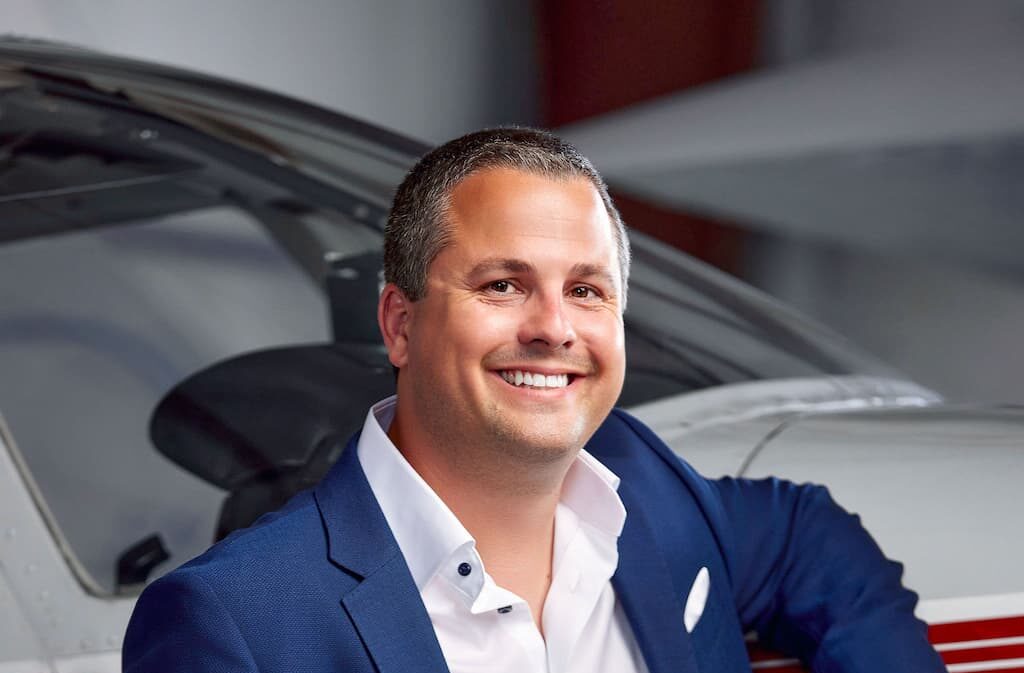In a world where success stories often begin with privilege and connections, Steven H. Andrews stands as a testament to what’s possible when blue-collar values meet unwavering determination. His journey from $75,000 in debt to managing hundreds of properties didn’t happen overnight, but it happened with the kind of authentic grit that resonates with everyday Americans seeking their own path to financial freedom.
“Coming from a blue-collar family, the values that were instilled in me were very simple: nothing will ever be given to you, and you have to work and earn everything,” Steven reflects. “Simply put, have the drive to create the life that you want. You don’t have to be the most talented in the room, but if you outwork everyone in the room, then you will be successful.”
This foundational philosophy would prove prophetic as Steven navigated the challenging terrain from struggling employee to successful entrepreneur. His parents didn’t just teach him about hard work; they modeled entrepreneurship in their own business, planting seeds that would eventually bloom into a real estate empire.
THE AWAKENING: WHEN EDUCATION IGNITES PASSION
The pivotal moment came during a seemingly routine college course at High Point University. What started as just another class requirement became the catalyst for Steven’s entire career trajectory. “When I took a real estate class at High Point University, I immediately fell in love with Real Estate,” he recalls. “There was something about buying buildings and seeing the money come in. I knew that the majority of the top 1% owned real estate. And I wanted that for myself as well.”
This wasn’t just academic interest; it was recognition of a fundamental truth about wealth building in America. While his classmates may have seen real estate as dry theory, Steven saw opportunity. The connection between property ownership and financial freedom became crystal clear, setting him on a path that would transform not just his own life, but the lives of countless students and clients who would follow his methodology.
THE CRUCIBLE: TURNING CRISIS INTO CATALYST
The defining moment of Steven’s entrepreneurial journey came when he faced a financial reality that would crush many people’s dreams. At $75,000 in debt while earning just $45,000 annually, he stood at a crossroads that demanded a fundamental choice: accept a lifetime of financial struggle or take unprecedented risks to break free.
“The pivotal moment for me when I was $75,000 in debt and only making $45,000 a year, was that I did not want to continue to run that rat race forever,” Steven explains. “I did not want to be in debt forever, I did not want to barely get by and live paycheck to paycheck forever. The mindset shifted when I took full control over what I wanted to do and I got out of my comfort zone and went after the Real Estate dream.”
This wasn’t just about financial necessity; it was about reclaiming control over his destiny. The debt that might have paralyzed others became Steven’s motivation to think bigger, act bolder, and refuse to accept limitations that society often places on people from blue-collar backgrounds.
CONQUERING FEAR: THE POWER OF MENTORSHIP AND COMMUNITY
Even with burning motivation, Steven faced the universal challenge that stops most aspiring entrepreneurs: fear. The fear of failure, the fear of judgment, the fear of the unknown. His approach to overcoming these psychological barriers offers a blueprint for anyone struggling with similar doubts.
“Surrounding yourself with people that know far more than you and that have done it before is the key to getting out of your comfort zone and overcoming fear and doubt,” Steven emphasizes. His mentor Joel became instrumental in this process, providing not just knowledge but the emotional support needed to push through moments of uncertainty.
“I still remember there were days that I woke up and I asked myself was I doing the right thing and could I do this and actually become successful,” Steven admits. “But surrounding yourself with people that had done it before changed the game for me because now you have people that are in your corner telling you to keep going and you can do it.”
THE FIRST LEAP: BETTING EVERYTHING ON POTENTIAL
Steven’s first property purchase reads like a masterclass in calculated risk-taking. With no money for a down payment, he used a credit card cash advance to fund the 15% required for a $35,000 property. This wasn’t reckless gambling; it was strategic leverage based on deep conviction about real estate fundamentals.
“I did not have the money to put down on it. I got a credit card cash advance off my credit card to supply the 15% down. I bet on myself to win,” Steven recalls. “Once I bought that property, I fixed it up, increased the rents and I refinanced it at the bank that initially financed the property for me and I pulled back all my working capital to pay that credit card right back off and rolled the net money to the next property.”
This first deal established the blueprint Steven would use hundreds of times: strategic acquisition, value creation through improvement, refinancing to extract capital, and immediate reinvestment. The process worked because it was grounded in solid real estate principles, not get-rich-quick schemes.
SCALING SYSTEMS: FROM SINGLE PROPERTY TO PORTFOLIO EMPIRE
Managing one property requires different skills than managing hundreds. Steven’s evolution from individual investor to portfolio manager demonstrates sophisticated understanding of business systems and operational excellence. His approach to scaling reveals why so many real estate investors plateau while others achieve exponential growth.
“The key to scaling is to have the right systems and philosophies in place. You have to have a system for everything from how do you rent out a property to how do you find the right tenant to how do you manage the maintenance side of it,” Steven explains. “If you do not have the systems in place, you will not be successful long-term. You could still scale the business, but that business will fall apart because it is physically impossible for you to manage it all on your own.”
This systems thinking separates successful entrepreneurs from those who remain trapped in the day-to-day operational grind. Steven’s methodology ensures that growth enhances rather than complicates business operations.
VIRTUAL INNOVATION: TRANSFORMING TRADITIONAL MODELS
The COVID-19 pandemic forced many businesses to adapt or die. Steven saw opportunity where others saw obstacles, using the crisis to innovate his entire business model. His creation of a fully virtual property management company through Realty Management Group represents the kind of forward-thinking that keeps successful entrepreneurs ahead of market changes.
“One of the things that I learned through COVID is that you can manage things differently and you can think outside the box to get those things done,” Steven notes. “I started to think about other ways coming out of COVID how we can do this and control expenses. I did just that by creating a virtual realty management company.”
The virtual model eliminates traditional overhead while improving tenant experience through online portals for applications, rent payments, and maintenance requests. This innovation demonstrates how challenging times can accelerate beneficial changes that might otherwise take years to implement.
THE MENTOR’S CALLING: PAYING SUCCESS FORWARD
Steven’s transition from successful investor to business coach and mentor represents the natural evolution of someone who understands that true success includes helping others achieve their goals. His decision to share his methodology through courses and coaching stems from gratitude for the mentorship he received and recognition of the multiplier effect of developing others.
“I became a business coach and mentor to help people become successful in real estate. I know I would not be where I’m at today if it wasn’t for the people that I surrounded myself with and my mentor Joel,” Steven reflects. “I am so grateful for those relationships that have truly shaped me into who I am today and helped me become successful but now I want to return that favor.”
His approach to mentorship emphasizes practical application over theoretical knowledge. Students learn the same strategies Steven used to build his portfolio, without the fluff or unrealistic promises that characterize many real estate education programs.
OVERCOMING THE VICTIM MENTALITY: OWNERSHIP AND ACCOUNTABILITY
Through his coaching work, Steven has identified what he considers the biggest barrier to entrepreneurial success: victim mentality. His approach to helping students overcome this mindset reflects his own blue-collar upbringing and personal accountability philosophy.
“The biggest barrier that I see currently is people have a victim mentality. They make excuses on why they can’t do something or that someone treated them wrong or that shouldn’t have happened to them,” Steven observes. “You have to own your success, and with that you have to own mistakes, you have to lead yourself in the right direction and not have a victim mentality.”
This tough-love approach might seem harsh, but it reflects Steven’s understanding that entrepreneurial success requires taking complete responsibility for outcomes. External circumstances may influence situations, but successful entrepreneurs focus on what they can control rather than what they cannot.
THE NEW AMERICAN DREAM: LITERARY SUCCESS AND BROADER IMPACT
Steven’s award-winning, best-selling book “The New American Dream” represents more than personal achievement; it’s a manifesto for a generation seeking alternatives to traditional career paths. The book’s success demonstrates hunger for authentic success stories that speak to everyday Americans rather than those born into privilege.
“I was inspired to write the award-winning, best-selling book called The New American Dream because I wanted to inspire the next generation of individuals to become successful in real estate,” Steven explains. The book’s most powerful chapter, “When Enough is Enough,” addresses the deeper psychological aspects of success and the importance of defining achievement on personal rather than societal terms.
“It is so powerful to take control of your life and not compare to someone else’s where you go after your dreams and not someone else’s,” Steven notes. “Just that chapter alone has changed so many lives for the better which means don’t do what the world tells you you should do, do what will make you happy.”
BUILDING AUTHENTIC INFLUENCE: The Power of Raw Truth
The book’s success stems from Steven’s willingness to share his story without polish or pretense. Readers connect with his authenticity because it mirrors their own struggles and aspirations. “I think it resonated with people because of how raw, straightforward, and to the point it came from,” Steven explains.
“When I first got into Real Estate, I was just an ordinary guy struggling to make ends meet and I became successful. That resonates so well with so many people because there’s a lot of people that are living paycheck to paycheck that want so much more out of life.”
This authenticity has opened doors Steven never expected, from corporate and nonprofit board positions to speaking opportunities and expanded business ventures. Literary success became a platform for broader influence and impact.
TIMELESS PRINCIPLES IN CHANGING MARKETS
Despite technological advances and market evolution, Steven maintains that real estate fundamentals remain constant. His perspective on market timing reflects deep understanding of long-term wealth building principles that transcend short-term market fluctuations.
“I think the fundamentals of real estate do not change. I think the fundamentals of real estate in the 60s and 70s are the same as they are here in 2025,” Steven observes. “The two best times to buy Real Estate was 30 years ago and yesterday. Real Estate will just continue to go up overtime so you do not want to miss the opportunity.”
This long-term perspective helps investors avoid the paralysis that comes from trying to time markets perfectly. Steven’s approach emphasizes consistent action over perfect timing, a philosophy that has served him well through various market cycles.
THE SPIRITUAL FOUNDATION: Faith and Daily Practice
Underlying Steven’s success is a spiritual foundation that provides both motivation and perspective. His daily practices reveal the importance of grounding ambitious goals in deeper purpose and meaning.
“There are so many daily habits that I make sure I execute on a daily basis to keep the success coming, but there’s two that if you do really well, then it does not matter what happens that day you will be grounded,” Steven shares. “The first is praying to the Lord every single morning to make sure my priorities for the day are in place. And the second is making sure I have the right plan in place to execute the success I want to have every single day.”
This spiritual dimension adds depth to Steven’s success story, showing that sustainable achievement requires more than just financial goals and business systems.
LIVING FOR TODAY: A Different View of Legacy
Steven’s perspective on legacy challenges conventional thinking about building empires for future generations. His philosophy emphasizes present-moment living and immediate positive impact over distant posthumous recognition.
“I’ve never thought about what I have done from a legacy standpoint,” Steven admits. “For me it’s more about living today because we’re not promised tomorrow. But I do hope that my course, my book, and the people that I have influenced over the years and I have crossed paths with, I hope they’ve all gotten something positive from our interaction.”
This approach reflects the “When Enough is Enough” philosophy from his book, focusing on creating meaningful impact today rather than building monuments for tomorrow.
THE ROAD AHEAD: Expanding Impact and Influence
Steven’s vision for the next five years demonstrates the evolution from individual success to systemic impact. His goals encompass business growth, educational influence, and community service, showing how successful entrepreneurs can create value across multiple dimensions.
“My virtual real estate company is thriving and I want to continue to grow it and not just managing real estate, but continuing to flip houses and provide affordable housing for people,” Steven explains. “When I look to my personal brand and what I do at stevenhandrews.com, I look for that to continue to help and shape the future of people looking to get into real estate.”
His commitment to serving on corporate and nonprofit boards reflects understanding that business success carries responsibilities to broader community development.
WISDOM FOR THE NEXT GENERATION
Steven’s advice to his younger self encapsulates lessons learned through decades of entrepreneurial experience. His emphasis on dreaming big and ignoring judgment speaks to universal challenges faced by ambitious individuals from modest backgrounds.
“If I could go back to my younger self and give one piece of advice, it would be to go after your dreams earlier,” Steven reflects. “At times when you go after your dreams and dream really big people judge you and you should not allow that judgment or the fear of judgment or the fear of failing to stop you from realizing your dreams.”
“Dream extremely big because if you only get 75% of the way there, guess what you’re still going to be extremely successful so dream big and go after those dreams and do not care what others think because at the end of the day this is your life. This is your story and not theirs to tell.”
THE CONTINUING JOURNEY
Steven H. Andrews represents a new generation of entrepreneurs who understand that success without purpose is empty, and that true achievement comes from helping others realize their potential. His journey from debt to wealth, from employee to entrepreneur, from student to teacher, demonstrates that the American Dream remains alive for those willing to work for it.
His story resonates because it’s authentic, accessible, and actionable. Steven didn’t inherit advantages or discover secret formulas; he applied timeless principles with modern innovation, surrounded himself with mentors, and maintained the discipline to execute consistently over time.
As he continues building his real estate empire, coaching the next generation of investors, and serving his community, Steven H. Andrews proves that extraordinary success can emerge from ordinary beginnings when fueled by extraordinary determination and guided by unwavering principles.
The blue-collar values instilled in childhood continue to shape his approach to business, relationships, and life. In a world of complex financial instruments and sophisticated strategies, Steven’s success reminds us that the fundamentals of hard work, integrity, and helping others remain the foundation of lasting achievement.




